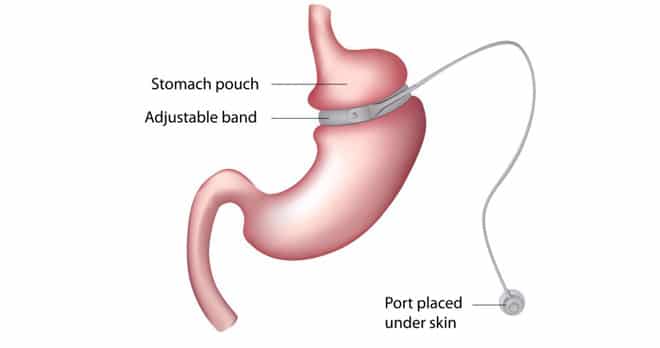Risks and benefits of weight loss surgery procedures

Statistics
The review found that those undergoing gastric bypass operations lost more weight—an average of 66 percent of their excess weight, compared to 45 percent average excess weight loss for those undergoing gastric banding procedures.
According to a 2011 estimate, some 120,000 bariatric procedures are performed annually in the U.S. Worldwide, gastric bypass accounts for about 47 percent of weight loss procedures, while gastric bands account for about 18 percent.
The review found that those undergoing gastric bypass operations lost more weight—an average of 66 percent of their excess weight, compared to 45 percent average excess weight loss for those undergoing gastric banding procedures.
Researchers found dramatic differences between the two procedures in controlling diabetes. More than two-thirds of gastric bypass patients with Type 2 diabetes saw remission of the disease, compared to less than a third of gastric band patients.
Gastric bypass surgery also lowered hypertension (high blood pressure) better than gastric banding. Nearly half of patients (48 percent) with hypertension reported remission after two years with gastric bypass, compared to less than a fifth (17 percent) for those undergoing gastric band procedures.
In addition, gastric bypass also improved hyperlipidaemia, characterised by high levels of cholesterol, triglycerides, and lipoproteins in the blood. About 60 percent of gastric bypass patients reported remission in the studies, compared to about 23 percent of gastric band patients.
Risks v benefit
Based on these statistics you may therefore think that gastric bypasses should be the first line option of weight loss surgery. However patients and the medical profession have to also consider the risk as well as the benefits.
The first risk is actually surviving the operation. Whilst both procedures have relatively low mortality risk – bypass at 0.3% is 3 times higher than gastric banding and as it is a much more complicated procedure if anything does go wrong in the surgery the initial complications tend to be far more serious (such as life threatening sepsis from leaks) and result in long recovery times.
Further, patients who have had a gastric bypass generally need life long vitamin and nutrient supplementation as the procedure works partly through malabsorption – not only is less fat absorbed from food but so too protein, carbohydrates, vitamins and minerals. If patients don’t take supplements they will generally start suffering from fatigue, poor skin, hair and nails. Also a fairly common complication of a gastric bypass is diarrhoea because less water is also absorbed back into the body.
Finally, of course, a bypass is irreversible whereas if a patient with a gastric band reaches their goal weight they can, if they wish, have the band removed relatively easily.
Having said that, bands are not without their complications and, indeed, these are far more common than bypass complications. Bands commonly slip or erode into the stomach, need regular adjustments and are prone to infection. A slipped band is a medical emergency and if not removed quickly will lead to stomach necrosis, sepsis and even death.
If a patient is paying privately for their procedure there is also the financial consideration – bypass will generally cost around twice as much as a band initially, although each follow up appointment for a band adjustment will usually incur a consultation fee that adds up over the years.
My experience
From a medical negligence point of view I have acted for clients in weight loss surgery claims for and continue to act for patients who have suffered negligence in respect of both main procedures. Whilst this will only affect the minority of procedures, these cases have included negligently performed bypasses, the wrong type of bypass, the wrong type of procedure in general, failure to properly deal with band slippage and failure to properly deal with band erosion.
When considering any form of weight loss surgery it is vital to ensure that your surgeon has appropriate experience of the procedure and also fully explains both the benefits and risks.